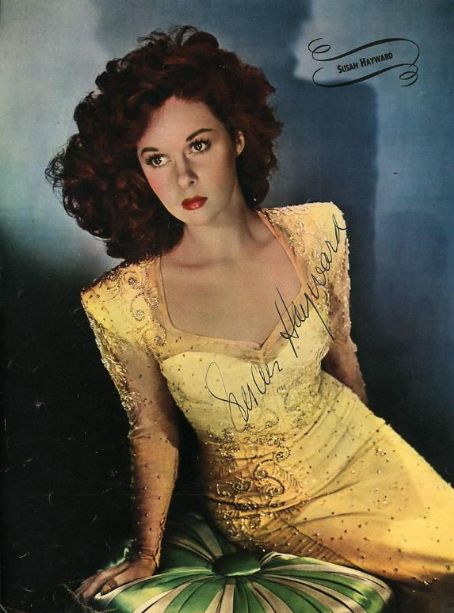HAYWARD CENTENNIAL FINALE
by Nathaniel R
Oscar buffs might be the only people who still regularly talk about Susan Hayward but her Oscar record was impressive enough to warrant that conversation. Five nominations with one win, all in the Best Actress category, is not nothing. In fact, her record is a match with Audrey Hepburn and Anne Bancroft and another Susan (Sarandon). But when I first got interested in Susan Hayward before I'd seen any of her films, what drew me in was the abundant hysteria within the posters, titles, and taglines for her movies. Or to quote Rupert Everett in My Best Friend's Wedding:

The misery. The exquisite tragedy. The Susan Hayward of it all!"
She lived (onscreen at least) for exclamation points so it's fitting then that her Oscar win came from I Want to Live! (1958). But to close out our celebration counterintuitively in reverse, let's end with a film from when Hayward was a young and hungry actress without much pull...
One famous anecdote has it that before she had any screen credits to speak of she was told to pack it up and leave Hollywood. Her famous retort:
I like oranges. I think I'll stay."
So she fought her way up the Hollywood ladder with apparent sass and a combo of talent and sizeable moxie. Here is one of two or three early roles that clearly paved the way for her future superstardom by making the moguls and movie audiences sit up and take note.
 Hayward rocks Bergman's world. Bergman doesn't want it rocked.
Hayward rocks Bergman's world. Bergman doesn't want it rocked.
ADAM HAD FOUR SONS (1941)
The first half hour of this family melodrama is amiable enough. Headliner Ingrid Bergman, playing a governness to a four young sons of a sudden widower named Adam (Warner Baxter with King Kong's Fay Wray appearing briefly as his doomed wife), is giving typically sensational closeups but the film itself is lacking in much pizazz or conflict. That all changes after the time jump when the boys are suddenly grown young men and the eldest has a surprise for the family. He's brought home a new wife named Hester that none of them knew about from his last station in the war. Hayward has barely entered the frame as the young wife when we get a closeup of Bergman all threatened and suspicious about her presence. The movie star is way ahead of both the plot and the audience here. Her turf has been invaded and she immediately dislikes the young girl.
Hayward's first few scenes are a fun reminder that movies can often be read on multiple levels at once. You can read Hester's entrance on a pure plot level (the young unfamiliar beauty suddenly changing the family dynamic) but it's more fun to read it on a studio system star level (the young hungry starlet eager to get a piece of a bigger star's pie). Hayward was famously unhappy with the roles she was getting early in her career so Adam Had Four Sons must have felt like a gourmet meal at the time. She's the driving engine of most of what there is of a plot and the men barely register but from how she toys with them.
 Hester getting her brother-in-law (Richard Denning) drunk
Hester getting her brother-in-law (Richard Denning) drunk
Hayward dives in with no pleasantries or manners or silverware and just devours her scenes. She's all caps BAD GIRL from the first moment, kissing her new brother-in-laws way too emphatically and calling her father-in-law "Dad" before the whole family has even learned her name. Before long she's liquored up her sexiest brother-in-law (Creature from the Black Lagoon's Richard Denning) and plotting to bed him.
There are few things more exciting in middling movies than a charismatic star's arrival and Hayward shakes the picture to life. There's a lot of 'rough draft' work of her bad girls to come albeit with less nuance. She even has two drunk scenes before the end of the picture. Was it Adam Had Four Sons that typecast her as an unhinged alcoholic? I'm not enough of a Hayward expert to know but she does play drunks superbly. If you've ever spent time with an alcoholic you'll know that the actress nails some of the trickier nuances that less accomplished "drunk scenes" don't ever think to reach. Slurring your speech is easy enough but you can practically see Hayward's eyes refocusing in key moments, as if her body is always a beat behind her chemically induced emotional swings. It's a marvelous acting trick.
 Hayward has given her new cousin a heart attack while Bergman looks on helplessly
Hayward has given her new cousin a heart attack while Bergman looks on helplessly
Hester is the kind of bad girl you love to hate in the middle of the picture seducing her sexiest brother-in-law and giving both the star governess and new cousin Phillipa (a wonderfully blunt Helen Westley in one of her last roles) heart attacks, whether figurative or literal.
Unfortunately towards the end of this otherwise forgettable programmer, the screenplay (and Hayward herself) opt for Pure Evil and Hester suddenly becomes The Destroyer of Families that is all too familiar for moviegoers with any sense at all of mainstream cinema's default sexism. Still there's a special kind of thrill to be had in watching Hayward as Hester delight in her own capacity for immorality. Her laughter at her own callousness is spooky.
But if you have a guilty pleasure yen for catfights between movie stars, the Bergman vs Hayward scenes are not to be missed in this otherwise forgotten picture.

 the husband (Johnny Downs) finally realizes what his new wife is made of.
the husband (Johnny Downs) finally realizes what his new wife is made of.
OUR SUSAN HAYWARD CENTENNIAL IS A WRAP
My Foolish Heart (1949)
David and Bathsheba (1951)
I'll Cry Tomorrow (1955)
Her Last Oscar Appearance (1973/1974)
I Want to Live! (1958)